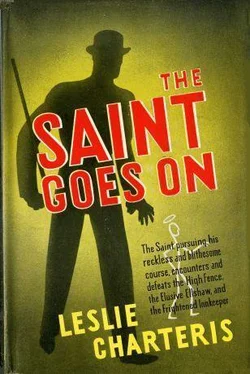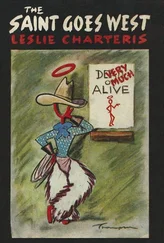He got up out of the armchair into which he had thrown himself, with a quick smile that wiped the hard calculating lines out of his face in a flash of careless friendliness that was absurdly comforting. She really was rather beautiful, even if that moment found her at a loss for anything but the conventional answer.
"I don't know why you should take so much trouble—"
"It's no trouble. Most of us have to earn our living, and if there is any useful racket working around here I shall get my percentage out of the gate. I'll let you know where I get to, and you can keep in touch with me. I haven't made up my mind yet what part I'm going to try to put over, so you'd better not take a lot more risks like this in case anybody got wise to us. If I want to tell you anything, I'll leave a note" — he glanced swiftly about the room — "under that corner of the carpet. And you'd better park your mail in the same place. Unless it's desperately urgent. Don't worry, kid — Hoppy and I are rough on rats, and when the ungodly think up a game that we didn't play in our cradles…"
He left the rest of the sentence in the air, with the hairs at the back of his neck tingling.
While he talked, he had become faintly aware of a queer vibration that was at first too deep in its choice of wavelength to be perceptible to any ordinary faculty. And then, gradually, it grew strong enough to be felt. A glass upturned over the neck of the carafe on the washstand trilled in a sudden shrill relay of the impulse. He listened, in utter silence, and heard something like the rumble of wheels roll through the earth and come to a thudding stop far underneath his feet.
Julia Trafford's face was suddenly white in the dim light which robbed the tapestry covering of the chairback behind her of much of its hideousness. Her lips parted breathlessly.
"That's it," she whispered, with her grey eyes widening against his. "You heard it yourself — didn't you? That's what I've been hearing."
The lamplight cut dark lines and piratical masses of shadow out of his brown face, brought up the glint of blue steel in his mocking gaze. He stood checked in precarious stillness, with the white scrap of his cigarette clipped between steady fingers; and the lamp threw his shadow towering up the wall so that his head and shoulders stooped over the low ceiling.
"How far away is this railway?" he said.
"The line's about five miles inland — the nearest station is Colyford."
He nodded.
"Go back to your room, bright eyes," he said, and his hand touched her shoulder as she stood up. "And don't lose any sleep over it. Whatever this racket is, I'll take it apart and see what makes it go."
He closed the door after her, and found Hoppy Uniatz gaping at it with the glazed other-worldly look of a man who is going to be seasick. For a couple of seconds he studied the phenomenon in fascinated silence; and then he cleared his throat tactfully, and Mr. Uniatz came out of his trance with a guilty start.
"I could give dat dame a tumble sometime — when I ain't got nut'n better to do," he said, in a tone so overpoweringly blase that the Saint blinked at him in considerable awe.
Simon would have liked to probe deeper into this remarkable statement, but he reserved his curiosity for a more leisured date.
"I think I'll wander about the place and look at the architecture," he said.
"Okay, boss." Mr. Uniatz roused himself finally out of his dreams, and dragged out his Betsy. He slid back the jacket and inspected the cartridge in the chamber with unromantic stoicism. "Wit' you an' me on de job, I guess dis racket is on de skids."
"With me on the job, it may be," said the Saint calmly. "You're going to stay here and snore for both of us — and that ought to be a pushover for you."
He was firm about this, in spite of Hoppy's injured protests. For a partner in a gun-fight, Simon would have asked nobody better; but for a tour of stealthy investigation he would as soon have chosen a boisterous young bison.
"I want you to look after Julia," he said craftily, and Mr. Uniatz brightened. "Where are you going?"
"Anyt'ing you say goes, boss," said Hoppy, with his hand on the door-knob.
"You don't have to go," said the Saint coldly. "I said look after the girl, not at her. Her room's just down the passage on the other side, and if she's in trouble you'll be able to hear her. When she wants you in her bedroom I'm sure she'll ask for you."
He left Mr. Uniatz brooding happily over this consoling thought, and went out into the dark corridor. At such times of emergency the Saint's fluency of shameless inventiveness was unparalleled — he had not the faintest idea where Julia Trafford's room was actually situated, and the fear of what might happen if an amorous and impatient Mr. Uniatz went prowling hopefully into the bedchamber of a hysterical cook was perhaps one of the most disturbing thoughts in his mind at that moment.
The passage was more or less, rather less than more, lighted by the wavering gleam of a small oil lamp hung in a bracket on the wall — from the beginning he had noticed this prevalence of primitive illumination in the hotel, for he had seen the silver pylons of the national electric supply grid spanning the valley as he drove down. Downstairs it was quite dark; but on these ventures he carried his own illumination which was less conspicuous in any case than switching on the ordinary lights in any place he wanted to explore.
The dim beam of an electric flashlight in his hand, irised down to the thinnest useful pencil of luminance by a circle of tinfoil pasted over the lens, guided him about the ground floor. No creaking boards betrayed his movements, for he had a tread like a cat when he chose to use it, and an uncanny instinct for treacherous footings. He covered the rooms which he had seen before, hall and dining-room and lounge bar, and others which he had not seen but which were roughly what he would have expected to find. The kitchen was behind the dining-room, a big stone-flagged room like a barn, which must have served for a staff dining-room as well, and might well have held even more distinguished company in the days when eating was a heartier and more earnest business. Opening off the kitchen was a long paved passage which seemed to run the length of the building. He tried the different doors, each with the same care and silence, and reviewed a series of sculleries, pantries, lavatories, coal and wood cellars, wine and beer stores, and a small staff sitting-room. The last door, at the end, appeared to lead out into a yard at the back — it was locked on the inside, and when he turned the key he found himself in the open under the shadow of the garage.
He was retracing his steps when he heard the dull vibrant rumble under his feet again. It was much more distinct than it had sounded upstairs, with a definite metallic harshness, but even then it was not so loud that he could fix it clearly in his mind. If he had been there as an ordinary unsuspecting guest, it might not have attracted his attention at all — he would probably have put it down subconsciously to a heavy lorry passing on the road outside, and would never have felt urged to probe into it further. Also, the place being what it was, he would very soon have been in bed and asleep; and there was nothing sufficiently startling about the muffled noise to wake him. But he was not asleep and he was not unsuspecting, and he knew that the sound was not quite the same as that of a passing lorry.
He opened another door in the passage and found himself in another short length of corridor — it was scarcely large enough to be called an inner hall. On one side was a door carrying the painted word "Private": it was locked, and he guessed that this was Jeffroll's own sanctum. On the other side was a red curtain, and when he went through it he discovered himself back in the diminutive lounge, but on the serving side of the bar.
Читать дальше












